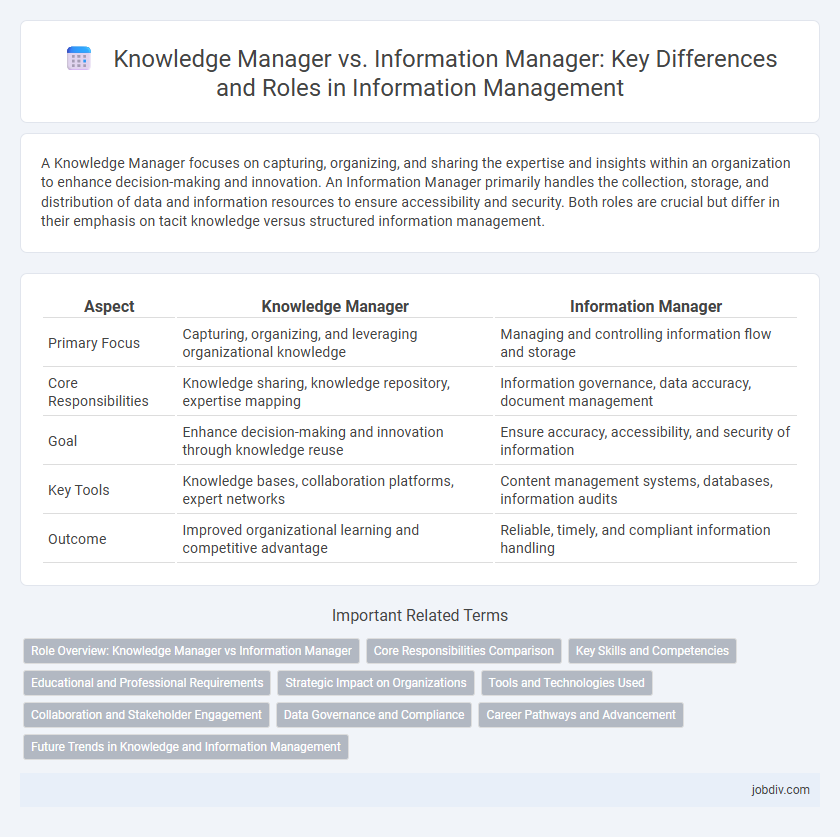A Knowledge Manager focuses on capturing, organizing, and sharing the expertise and insights within an organization to enhance decision-making and innovation. An Information Manager primarily handles the collection, storage, and distribution of data and information resources to ensure accessibility and security. Both roles are crucial but differ in their emphasis on tacit knowledge versus structured information management.
Table of Comparison
| Aspect | Knowledge Manager | Information Manager |
|---|---|---|
| Primary Focus | Capturing, organizing, and leveraging organizational knowledge | Managing and controlling information flow and storage |
| Core Responsibilities | Knowledge sharing, knowledge repository, expertise mapping | Information governance, data accuracy, document management |
| Goal | Enhance decision-making and innovation through knowledge reuse | Ensure accuracy, accessibility, and security of information |
| Key Tools | Knowledge bases, collaboration platforms, expert networks | Content management systems, databases, information audits |
| Outcome | Improved organizational learning and competitive advantage | Reliable, timely, and compliant information handling |
Role Overview: Knowledge Manager vs Information Manager
A Knowledge Manager focuses on capturing, organizing, and leveraging organizational knowledge to enhance decision-making and innovation. An Information Manager oversees the collection, storage, and distribution of data and information, ensuring accessibility and security across the enterprise. Both roles aim to optimize information flow, but Knowledge Managers emphasize knowledge assets while Information Managers prioritize data management systems.
Core Responsibilities Comparison
Knowledge Managers focus on capturing, organizing, and disseminating organizational knowledge to enhance decision-making and innovation, often managing databases, knowledge repositories, and learning systems. Information Managers oversee the acquisition, storage, security, and distribution of information assets, ensuring data integrity and compliance with information governance policies. Both roles collaborate to optimize information flow, but Knowledge Managers prioritize knowledge sharing and utilization, while Information Managers emphasize data management and accessibility.
Key Skills and Competencies
Knowledge Managers excel in expertise like knowledge capture, organizational learning, and intellectual capital management, driving innovation through robust knowledge-sharing frameworks. Information Managers focus on data governance, information architecture, and systems integration, ensuring accurate data flow and compliance across platforms. Both roles require strong analytical thinking, communication proficiency, and project management skills to optimize organizational information assets effectively.
Educational and Professional Requirements
Knowledge Managers typically require advanced degrees in knowledge management, information science, or business administration, coupled with experience in data analysis and organizational learning. Information Managers often hold degrees in information technology, library science, or computer science, emphasizing skills in data architecture and information systems management. Both roles demand strong analytical abilities, but Knowledge Managers lean more towards strategic knowledge flow and learning processes, while Information Managers focus on maintaining and organizing information infrastructure.
Strategic Impact on Organizations
Knowledge Managers drive strategic innovation by harnessing organizational expertise to improve decision-making and competitive advantage. Information Managers optimize data flow and infrastructure, ensuring accurate, timely access to information critical for operational efficiency. Together, they enhance organizational agility, supporting informed strategy development and sustainable growth.
Tools and Technologies Used
Knowledge Managers typically utilize advanced knowledge management systems (KMS), including platforms like SharePoint, Confluence, and specialized content management systems that support knowledge sharing, collaboration, and ontology management. Information Managers often employ enterprise content management (ECM) tools such as Documentum, OpenText, and database management systems to organize, store, and secure structured and unstructured data. Both roles increasingly leverage AI-driven analytics, data visualization tools, and cloud-based solutions to enhance data accessibility and decision-making processes.
Collaboration and Stakeholder Engagement
Knowledge Managers drive collaboration through structured knowledge-sharing platforms that facilitate continuous learning and innovation among stakeholders. Information Managers focus on organizing and maintaining accurate data repositories to ensure stakeholders access reliable information for decision-making. Effective stakeholder engagement in Knowledge Management fosters a culture of collaboration, while Information Management emphasizes the integrity and accessibility of data.
Data Governance and Compliance
Knowledge Managers prioritize organizing and leveraging intellectual assets to enhance decision-making, while Information Managers focus on overseeing data lifecycle management with a strong emphasis on data governance and regulatory compliance. Information Managers implement frameworks ensuring data accuracy, privacy, and security aligned with standards such as GDPR, HIPAA, or CCPA. Effective data governance led by Information Managers mitigates risks and ensures compliance, whereas Knowledge Managers facilitate strategic use of information for organizational learning and innovation.
Career Pathways and Advancement
Knowledge Managers typically focus on capturing, organizing, and sharing organizational knowledge to improve decision-making and innovation, often advancing into roles like Chief Knowledge Officer or Knowledge Consultant. Information Managers specialize in managing information systems, data governance, and IT infrastructure, with career pathways leading to positions such as Chief Information Officer or IT Director. Both roles offer advancement opportunities in leadership, but Knowledge Managers usually progress in strategy and innovation, while Information Managers advance through technology management and information security domains.
Future Trends in Knowledge and Information Management
Future trends in knowledge and information management highlight the integration of artificial intelligence and machine learning to enhance data retrieval and decision-making processes. Knowledge managers are increasingly focusing on fostering collaborative platforms that leverage collective intelligence, while information managers prioritize the development of automated systems for efficient data governance and security. The convergence of these roles is driving the adoption of smart technologies and analytics to transform organizational knowledge ecosystems.
Knowledge Manager vs Information Manager Infographic

 jobdiv.com
jobdiv.com